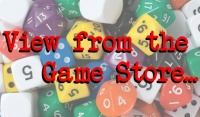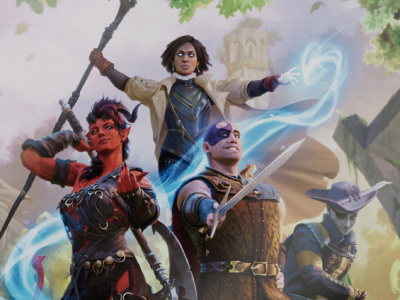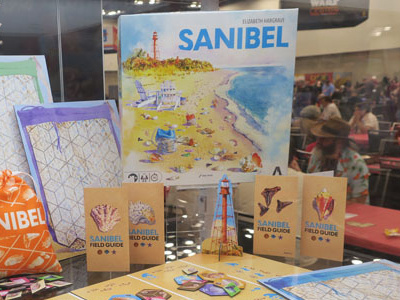 View from the Game Store is a new weekly(-ish) column by Marcus King of Titan Games & Music in Battle Creek, Michigan. This week, King looks at how the relationship between publishers, distributors, retailers and the consumer has changed over the last decade, and what it means:
View from the Game Store is a new weekly(-ish) column by Marcus King of Titan Games & Music in Battle Creek, Michigan. This week, King looks at how the relationship between publishers, distributors, retailers and the consumer has changed over the last decade, and what it means:Keeping in mind these are just my opinions, based on my experiences as a retailer for 24 years in the game industry, here is what I have seen, and what I see as the future of tabletop gaming.
Years Ago:
When I started as a game store owner, consumers valued a retail store. Most stores were "destination" stores, because gamers would seek them out. Retail stores were the place to learn about new games, to trade in old games, to meet other gamers, and game.
When I started at this as a game storeowner in 1986, publishers made games, distributors stocked them--usually fairly deeply, and retailers called distributors to buy the games they sold. Distributors also made SALES calls, where they would call the retailer and pitch them on new games. Retailers stocked games and consumers went to those "fairly scarce" locations to see the games. Retailers were the center of information for consumers, distributors were the source of that information for the retailers. Publishers published. Distributors distributed. Retailers retailed. Life was simple.
Then, several things happened to change the industry: eBay, the Internet itself, Amazon and the birth of the discount game sources are what I am talking about (one could also argue that video games and home computers had a big impact too, and I believe that to be true, but in the scheme of things, not on the relationships aspect, which is what I am talking about today).
Prior to all that if you wanted a game you either called a company listed in Dragon magazine, or you went to a game store, or attended a convention. But, the Internet, eBay and other discount places changed all that.
Today:
Publishers make games. They sell them to distributors, direct to the consumer via the Internet, and at some conventions--how many conventions often depends on which publisher you are talking about. Publishers also sell direct to the retailers--and how much of this they do greatly depends on the success of their games. In this regard, the publishers now act as competition to both the distributors and retailers.
Distributors are more often now concentrating on the "order taking operations." Not information centers for the retailers. That is neither good or bad, mind you--it just is the case more often than not. Nowadays it matters MORE to me how quickly my rep at my distributor (Alliance Games, most often) returns my call, than how much information he has to relay to me. And, my distributor rep (Brian) is very capable of getting me information. But, more often than not, I get my information from other sources--such as ICv2, BoardGameGeek, RPGNet and others, to name only a few. I also get my information direct from publishers, where I am signed up for news releases from over 40 publishers.
Retailers are usually "outgunned" in the information on any given product--by the consumer! The consumer who likes Magic: The Gathering will read and learn about his one passion--while the retailer has maybe 2,500 products to keep track of, and over 200 new release titles every month to consider. So, the consumer knows MORE about their hobby than the retailer does. If you play Legends of the Five Rings--I know more about Magic than you do. But, you know more about L5R than I do. So, while I am "fairly informed" on more than a thousand products and publications--someone who is into D&D knows the release schedule maybe better than I do.
This has changed the relationships of all parties involved. Where the retail store owner used to be revered as a guy with the coolest possible job, they are now often looked at and viewed--by consumers--as some poor doofus who is hopelessly misinformed on all things gaming, and who is akin to a money grubbing greedy guy who charges "full retail price"--when, only dummy's pay full retail. The consumers know they can find the item at a discount. Distributors know that retail stores last, on average, about 18 months. Long term relationships take a back seat when you don't know if the guy will be ordering from you next year, or not.
Publishers, more and more capable of selling products direct to retailers, view the distributors as less valuable than before. Those same distributors, selling a lot of games direct to consumers also find the retailers less important to their operation. Some publishers have actually stopped selling their products wholesale.
So, what is the solution? Well, if you were hoping for a solution, I am sorry to disappoint. I don't have one. Owning two stores in Michigan, I wish I had a solution. I guess for me, the solution is to offer a good selection, take used games in trade, stock deeply in the lines we carry, have convenient hours, a well trained and professional staff, and offer gaming space for my customers to enjoy.
After all, in the age of the Internet you CAN find it cheaper elsewhere. You will find a better product knowledge elsewhere. What I can offer is a nice shopping environment you will enjoy coming to, and a good selection of merchandise to choose from you can take with you today. And, hopefully for some time to come, that will be valued by some consumers.
The opinions expressed in this column are solely those of the writer, and do not necessarily reflect the views of the editorial staff of ICv2.com.







